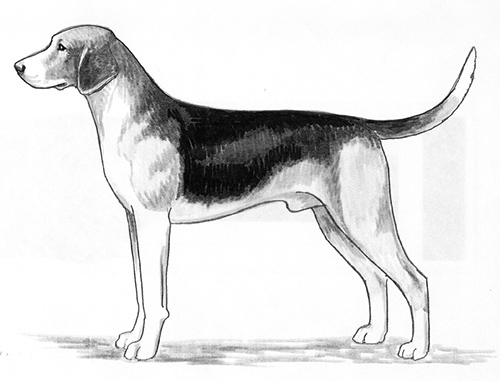Beagle Harrier
Scenthound Group
The goals and purposes of this breed standard include: to furnish guidelines for breeders who wish to maintain the quality of their breed and to improve it; to advance this breed to a state of similarity throughout the world; and to act as a guide for judges.
Breeders and judges have the responsibility to avoid any conditions or exaggerations that are detrimental to the health, welfare, essence and soundness of this breed, and must take the responsibility to see that these are not perpetuated.
Any departure from the following should be considered a fault, and the seriousness with which the fault should be regarded should be in exact proportion to its degree and its effect upon the health and welfare of the dog and on the dog’s ability to perform its traditional work.
History
Beagle Harriers were bred in France in the 19th Century. They were bred to hunt hare or deer in packs. They could be a mixture of the Beagle and the Harrier breeds, or they could be the mid-point between the two breeds, the truth is not really known. They were recognized by the FCI in 1974. The breed is very rare.
The Beagle Harrier was recognized by the United Kennel Club January 1, 1996.
General Appearance
A typical small foxhound, halfway in size between the smaller Beagle and the larger Harrier.
Characteristics
Energetic, determined, and loyal.
Head
SKULL
Rather broad. No prominence of occiput. The stop is not pronounced.
MUZZLE
Roughly equal in length to the skull. Never square; tapering without being pointed. The nasal bridge is straight, and the lips cover the lower jaw.
TEETH
The Beagle Harrier has a complete set of evenly spaced, white teeth meeting in a scissors bite.
Faults: Overshot or undershot.
NOSE
Black.
Fault: Butterfly nose.
EYES
Well open, and dark in color, with a frank, lively and intelligent expression.
EARS
Set at eye level, quite short and medium broad, the ears lie flat against the skull but turn slightly at the tips, which are rounded.
Neck
Well attached, and slightly arched.
Forequarters
The shoulders are long, oblique and muscular.
FORELEGS
Strong, straight and parallel.
Body
The ribs are moderately arched, and the sternum is long. The back is short, firm and muscular. The loin is strong and muscular, and may be slightly arched. There is very little tuck up.
Hindquarters
The hips are oblique and strong.
HIND LEGS
The upper thighs are fleshy and muscular. The hocks are close to the ground, and the rear pasterns are vertical.
Feet
Tight, with thick, hard pads.
Fault: Flat, splayed feet.
Tail
Set on high, long enough to reach the hock, and carried gaily in saber fashion.
Coat
Thick, not too short, and flat.
Color
Tri color, including grey tri color and white grey tri color.
Height
Height at the withers is from 18 to 20 inches.
Gait
Supple, lively, and sure footed.
Disqualifications
(A dog with a Disqualification must not be considered for placement in a conformation event, and must be reported to UKC.)
Unilateral or bilateral cryptorchid.
Viciousness or extreme shyness.
Albinism.

Looking for a Dog?
Find a dog that will fit your family.
Note: The breeders on this list are not endorsed by UKC.
©Copyright 1996, United Kennel Club
